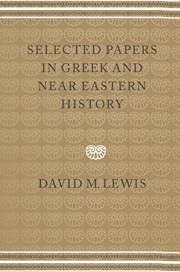Book contents
- Frontmatter
- Contents
- List of plates
- Preface
- Systems of reference
- GENERAL
- ATHENIAN
- 9 Public property in the city
- 10 Cleisthenes and Attica
- 11 Review of J. S. Traill, The Political Organization of Attica
- 12 Review of P. Siewert, Die Trittyen Attikas und die Heeresreform des Kleisthenes
- 13 The Kerameikos ostraka
- 14 Megakles and Eretria
- 15 The Athenian Coinage Decree
- 16 Athena's robe
- 17 The treaties with Leontini and Rhegion
- 18 Entrenchment-clauses in Attic decrees
- 19 Apollo Delios
- 20 After the profanation of the Mysteries
- 21 Aristophanes and politics
- 22 Who was Lysistrata?
- 23 A note on IG i2114 [= i3105]
- 24 The epigraphical evidence for the end of the Thirty
- 25 The financial offices of Eubulus and Lycurgus
- 26 The dating of Demosthenes' speeches
- 27 Law on the Lesser Panathenaia
- 28 The Athenian Rationes Centesimarum
- 29 The chronology of the Athenian New Style Coinage
- 30 Review of M. Thompson, The New Style Silver Coinage of Athens
- NEAR EASTERN
- Bibliography
- Publications of David M. Lewis
- Indexes
26 - The dating of Demosthenes' speeches
Published online by Cambridge University Press: 15 January 2010
- Frontmatter
- Contents
- List of plates
- Preface
- Systems of reference
- GENERAL
- ATHENIAN
- 9 Public property in the city
- 10 Cleisthenes and Attica
- 11 Review of J. S. Traill, The Political Organization of Attica
- 12 Review of P. Siewert, Die Trittyen Attikas und die Heeresreform des Kleisthenes
- 13 The Kerameikos ostraka
- 14 Megakles and Eretria
- 15 The Athenian Coinage Decree
- 16 Athena's robe
- 17 The treaties with Leontini and Rhegion
- 18 Entrenchment-clauses in Attic decrees
- 19 Apollo Delios
- 20 After the profanation of the Mysteries
- 21 Aristophanes and politics
- 22 Who was Lysistrata?
- 23 A note on IG i2114 [= i3105]
- 24 The epigraphical evidence for the end of the Thirty
- 25 The financial offices of Eubulus and Lycurgus
- 26 The dating of Demosthenes' speeches
- 27 Law on the Lesser Panathenaia
- 28 The Athenian Rationes Centesimarum
- 29 The chronology of the Athenian New Style Coinage
- 30 Review of M. Thompson, The New Style Silver Coinage of Athens
- NEAR EASTERN
- Bibliography
- Publications of David M. Lewis
- Indexes
Summary
It would be pointless to deny that this paper is to some extent a salvo in an exchange of fire which I have been conducting on and off with George Cawkwell for fifteen years or more, but of which very little more than the opening shots have ever got into print. Very early in life I suggested dates for Dem. XXII and xxiv which diverged from those given in the Ad Ammaeum of Dionysius of Halicarnassus. Some reply to my specific points was given in an article by Raphael Sealey, the last complete survey of the dates in that work, and Cawkwell also landed some well–aimed shots (I had in particular failed to read an apparatus criticus).
On the general point at issue Cawkwell warned us that the information available to us was scanty, and that, since we lack the means to test the accuracy of Dionysius' dates, we should resist the temptation to reject them as worthless. ‘Both the general histories and the Atthides and many lost speeches were available to Dionysius and his predecessors, and the dating of Demosthenes' speeches by means of internal evidence alone must have been far easier for him than for us.' He cites various specific cases of the kind of evidence which might have been available and concludes, ‘When such evidence was available to Dionysius, only for cogent reasons should his dating be rejected.’ Sealey had thrown the emphasis further back. Holding, in my belief, correctly, that the dates in Ad Amm. are not Dionysius' own, he reminds us that the dates had probably been determined by Alexandrian scholars and could command the respect of a lettered, if not a learned public.
- Type
- Chapter
- Information
- Selected Papers in Greek and Near Eastern History , pp. 230 - 251Publisher: Cambridge University PressPrint publication year: 1997



